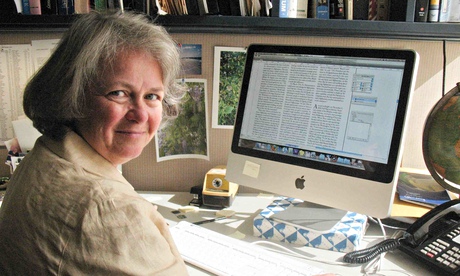
Why do people feel so strongly about grammar and punctuation?
We were all surprised when Lynne Truss’s bestseller, Eats, Shoots and Leaves, proved that people are passionate about apostrophes. I’ve been astonished at the reaction to my book. My sister, Dee, and I had been worried that the chapter in which I write about her transition from male to female would attract sensationalistic interest but I’ve been so amused to discover that the comma is a far more controversial issue.
Why do pedants correct mistakes as if affronted – as if a family member had been insulted?
People get attached to what they learned when young – it’s as if they feel they have to defend their entire youth.
Why should it matter if Barack Obama says “a very personal decision for Michelle and I”?
It is just a bit of a wince. Michelle Obama has no trouble saying “My daughters and me” – but she has more style. Someone recently suggested that Obama was deliberately doing it to seem one of the people. I don’t believe it.
The New York Times describes you as “one of a fearsome troika” of copy editors. Do you have a fearsome side?
On the back of my book is a quote from Adam Gopnik [staff writer on the New Yorker] from which the second sentence had to be lopped. It said: “Writers will be glad she is turning that pencil point on the public at large instead of on them.” As to the troika, there are actually four of us: my boss, Ann Goldstein, is brilliant, a translator of Primo Levi . She is much smarter than I am. We consult a lot. Elizabeth Pearson-Griffiths is Welsh and very beautiful, and her writers love her. And Carol Anderson is the one always asking: “But what is the rule here?”
Do we all want to see ourselves as good spellers?
“Are you a good speller?” is a trick question. When Ann interviews a potential copy editor, she will say: are you a good speller? Anyone who says “Yes” is a liability. It means that person does not have the self-doubt to look things up.
Have you clashed with writers about changes to their pieces or is that not New Yorker culture?
We have meetings before a piece closes where the editor, author, fact-checker and proofreader sit down together and, occasionally, I will think something is wrong that the author wants. I did have one author say: “What is this, the adverb police?” He was really irritated because I moved a few extraneous adverbs. Any sentence with two words ending in ly –you can do without at least one of them.
Who spelt flour wrong?
Janet Malcolm. She stopped me on the street the other day, having seen her name in the acknowledgements without knowing what it meant. I didn’t feel right putting her name in the body of the text to identify her as having made a typo, and she had not realised she provided me with my first step up. She had been married to Gardner Botsford, the then editor, and I had felt it was a little too complicated to go into all that. She wanted to know if I still had Gardner’s note thanking me. I said I did and she said: he wrote wonderful notes.
How modest is the copy editor’s art? Is it, as you suggest, like saying: tuck in that label. Might it sometimes involve suggesting a whole new outfit?
There are writers whose every word is just not quite right. If you were to try to fix all those words, you would have a new piece and an enraged second-rate writer.
Have you ever ultracrepidated (a wonderful word you introduce meaning going beyond your province)?
It is especially difficult with writers of humour. Do not try to perfect the jokes. With Woody Allen…
You didn’t try to polish his jokes?
Yes.
What happened?
The changes were roundly ignored. And so I took the point…
You barely touch on exclamation marks. I was taught by my mother, an English teacher, to avoid them.
They should be used conservatively. Elmore Leonard said there should be no more than two or three per 100,000 words. I think it should be two or three in a lifetime.
Could you live happily without the semicolon?
I could do without the semicolon, possibly because I misused it in my 20s. I used it as a gigantic comma.
You relate that editor William Shawn [New Yorker editor from 1952 to 1987] was squeamish about “fish-hooks, wigs, twins and midgets”. Why? Were these invariably excised from copy?
Yes. William Shawn had a set of twins, a son and a daughter, and the daughter was autistic and had to be institutionalised, and the son was very protected. He took it so hard he could not bear the sight of the word twins in print. It was just his fears and foibles.
And the wig?
No idea… maybe his mother wore a wig? He himself was bald. I don’t know what the midget problem was either. I mean, he was short. I do think each of these things was deeply personal.
Is there any comparison between your first job – inspecting for athlete’s foot at a swimming pool – and overseeing copy?
It might imply I was good at keeping bad elements out – except, I have to admit, I never knew what athlete’s foot looked like.

